Anatomy of an Era: Christian Peter, Part 2
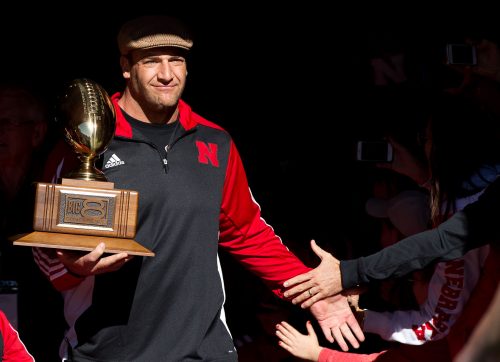
Excerpted from Chapter 93, No Place Like Nebraska: Anatomy of an Era, Vol. 2 by Paul Koch
Anatomy of an Era: Christian Peter, Part 2
Q: Charlie McBride’s methods of feedback were quite interesting, no?
CP: Well, listen, I don’t know if the statute of limitations has run out on some things -I don’t want to specifically go into certain stories- but let’s put it this way: he knew how to get the most out of his players.
Q: (laughs) I’ve talked to Charlie and a bunch of other D-linemen, Christian, so I don’t think there would be much that would surprise me by now.
CP: I would like to agree, but its 2010 and there’s too much potential liability in any of those stories for me to comment upon. (laughs) He got the most out of his players.
Q: Someone described it as, “Charlie knew each and every player so well that he knew what buttons to push and what buttons not to push for each individual.”
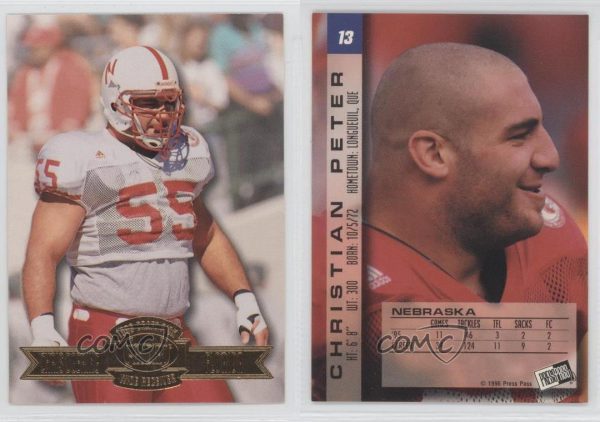
CP: Absolutely. You can’t treat every player the exact same. He was somebody who put demands on his players, but those demands he put, he put because he knew the specific individual -if he put his mind to it- that player could accomplish them.
Q: Interesting. So in other words, he had differing visions and set personal goals for each of you knowing what he knew about each and every one of you? Then it was up to you to learn, to come alongside, to grow and mature into that type of performer?
CP: He knew who he could push and who he couldn’t, who would react differently depending on certain situations. The man was a genius.
Q: So I have to ask, where were you within that paradigm? How were you best coached? How did you best respond?
CP: You know, I was probably somebody who responded well to what you would term ‘hard coaching.’
Q: Kevin Ramaekers said he responded to the real nasty, verbal, butt-chewing kind of stuff. Would you fall into the same mix?
CP: Yeah. I probably would fall into that same mold and type of player. I probably best responded to that style of coaching.
Q: Do you have a favorite game that stands out, Christian?
CP: Every time I got a chance to step out onto the Memorial Stadium field was a special moment.
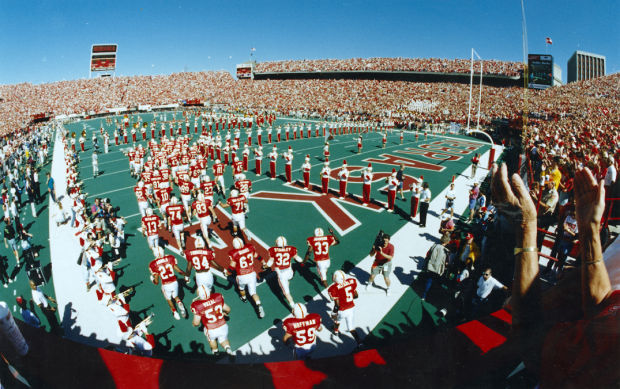
Q: What made it special for you?
CP: Like I said, I hate to repeat all the same answers, but it’s the tradition and the history and growing up in New Jersey and seeing the Nebraska-Oklahoma game my entire life, seeing the N on the helmets. All that stuff.
Q: Being part of something greater than yourself? Knowing some little kid somewhere in America is watching you play in the Nebraska/Oklahoma game in that same light?
CP: Absolutely.
Q: What about the home games in general?
CP: The tunnel walk was cool. Obviously, it wasn’t what it is today. Cosmetically, there is a lot more that goes into it today. It almost seemed like an entrance to a WWF fight. When we did it, it was a little bit more basic: roll your sleeves up and “let’s get ready to go fight.”
Q: Now, you were a captain your senior year, in ’95, and some guys say you had a way of giving truly memorable speeches before it came time to go out there on the field. How did you acquire your speech-making talents?
CP: Well, the best way to speak is from the heart. That’s the best way to get through to people. I just always said what was on my mind and what I thought was right, and I guess it was enough to get the guys excited and want to go out and play. But again, it wasn’t me, it was a combination of the guys that we had.
Q: Sure. And speaking of, were there any guys who you’d go against every day in practice who stand out to you, as far as making you a better player?
CP: The entire offensive line. You talk about Will Shields, Zach Wiegert, Aaron Graham, Brenden Stai… I mean, the list goes on what these guys accomplished in college and the pros. You’re talking about some of the best linemen that have ever played.
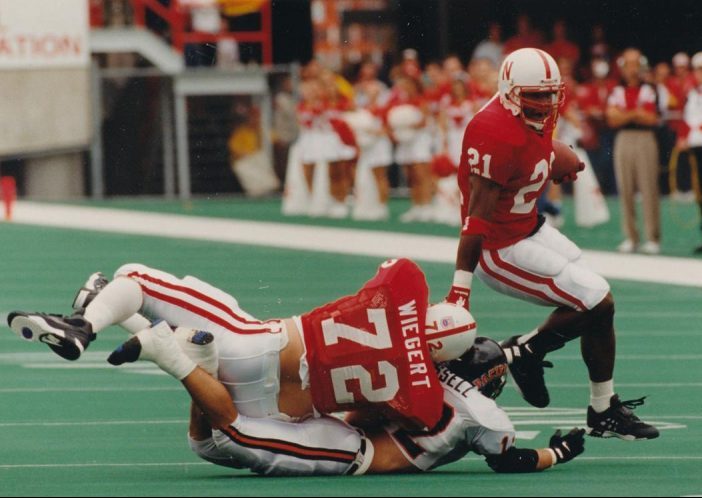
Q: A number of guys have said that the hardest day of the week for them was Tuesday or Wednesday, and that Saturday almost seemed like a day of playing with your kids. Would you agree?
CP: Yeah, I would have to agree on that. We had very, very physical and violent practices, and in turn, it made Saturday really easy. There were no situations we came across that were unexpected or surprising.
Q: You weren’t wide-eyed on Saturday because you put in the combat during the week?
CP: It’s pretty simple, you get out what you put in. And nobody practiced harder than we did.
Q: Any special practice moments?
CP: I can remember a lot of them. (laughs)
Q: Someone told the story of the day Aaron Graham got All-American and the ensuing mayhem that transpired… do you remember that at all?
CP: Me and Graham?
Q: It might have started with you and Aaron Graham, but I’m not entirely sure who it ended with…
CP: Oh, that was a daily occurrence. (laughs) It’s not one specific day. I can’t remember. You’re talking about every day.
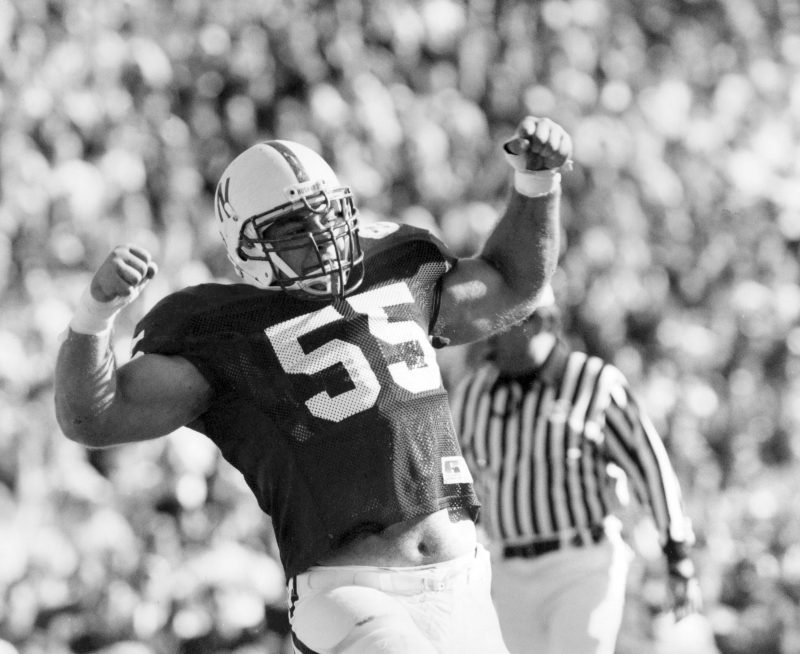
Peter vs. Kansas, 1994
JEFF BEIERMANN/THE WORLD-HERALD
Q: (laughing) And obviously you guys had your times down in The Pit, too?
CP: Oh yeah, it was fun down there.
Q: So what about the team as a whole? Why do you think Nebraska football was able to dominate for that run there? What separated Nebraska from the guys you were lining up against each week?
CP: Well, just like we’ve been talking about for the past 30 minutes…and also that we wanted it more than the other people wanted. We wanted it and worked harder, and in turn the harder we worked the better we performed. I don’t care if it’s football or whatever it is -life in general- you get out what you put in, you know?
Q: I suppose you’ve carried that on into your business life?
CP: I try to: both business and personal. It’s a little bit different. It’s more about finding the balance and being able to work more efficiently.

Available on Amazon.com
Q: As far as ‘balance,’ in what regard?
CP: Back then the only person I had to worry about was myself and my teammates. Now it’s my wife, the kids, it’s business responsibilities, so there’s a lot more that goes into it now. It seems that when you want to expend 110%… that something else has to give. And now it’s more about finding that work/family balance so that nothing gives. You continue to grow as a person, as a husband, as a father, as a businessman.
Q: I’m thinking that gives you a more profound respect for those coaches as you get older now and juggle family and work?
CP: I’m sure saying ‘Yes’ on that question. I’m sure it’s a question they’ll have the hardest time answering, finding that balance between work -which was football for them- and family. I’ll bet you 99.9% of them say that they did not do a good job of that, because it’s truly impossible. But they would say they had a wife who was very understanding and probably deserves a little credit and allowed them to do what they did.
Q: Hmmmm, sounds like what Coach Osborne has had to say about Nancy.
CP: He’s a perfect example, you know.
Q: Tell me a little more about what Coach Osborne meant to you. Special interactions?
CP: Words can’t describe what I feel about him. Or what he did for me and my family. I made a lot of mistakes while I was out there, and if it was at any other place I would have been done a long time ago, but for some reason he saw something in me. And I had some issues which he helped me out and he still supports me.
Q: Do you still keep in touch with Coach Osborne?
CP: Oh, yes.
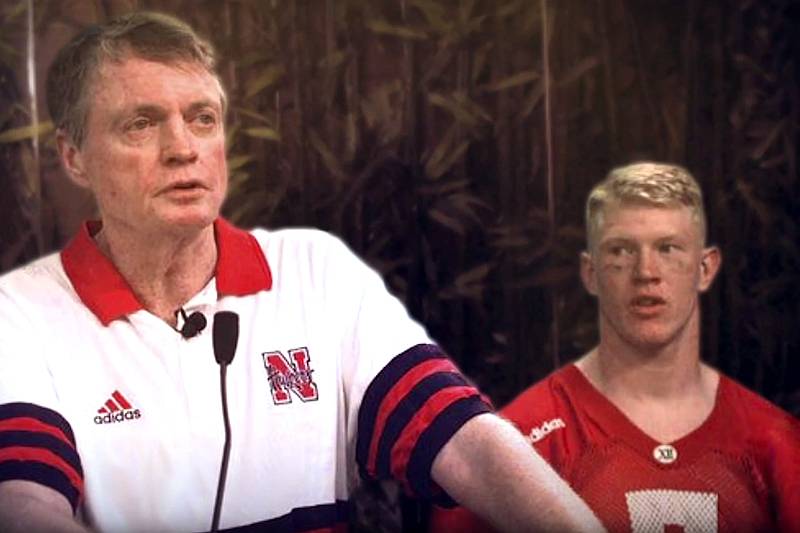
Q: Have you sensed any changes in the man as the years have passed? Or is he the same ‘rock’ that you knew as a young student-athlete?
CP: I think the best way to describe Coach Osborne -and it’s something I’d like to be able to someday say that I was- but the word is ‘consistent.’
Q: ‘Consistent.’ Interesting. So all the sacrifice, all the growing pains, the University of Nebraska experience… was it all worth it?
CP: Absolutely.
Q: Anything you wish you could do over? Differently?
CP: No. Nothing at all, except winning that ’93 championship.
Q: Funny you say that, because that’s one of my all-time favorite games as a fan of college football. And you know what, I don’t look at that game as us getting beat, but merely that we lost…
CP: No, we didn’t get beat. We kicked their ass. That’s why it was such a tough pill to swallow, because we didn’t lose. Because we had some really, really bad calls.
Q: Last question: is there anyone behind the scenes who made a huge difference to you as a student-athlete?
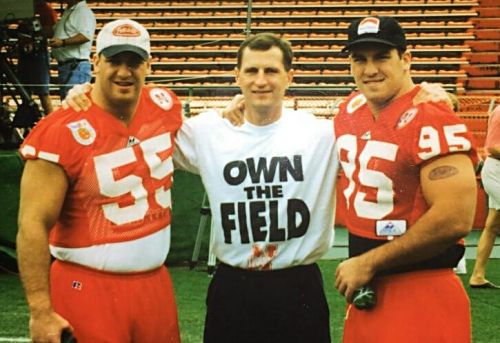
From left, Christian Peter, Trainer Doak Ostergard and Jason Peter
CP: Definitely Doak Ostergard. He was somebody who you could always go to. To sum Doak up would be: solid and reliable, always there for you. He’s what Nebraska football needs.
Q: Well, before we go, is there anything else in summary that we haven’t touched upon? That made Nebraska football great those years?
CP: No, I think we covered it all. Surely, I’ll think of something once we’re done here, and if I do I’ll text it to you tomorrow morning.
End conversation.
I must say, Christian seems to have softened up and mellowed out in these intervening years. Finding that elusive balance in life has been a challenge, as it is for many, especially for a guy whose personality is tilted to take things to the extreme end of the slippery slope. He’s still lets his actions speak louder than his words, though, and quite surprisingly made it all too clear that the Cornhusker teams of those years were indeed the Nebraskans’ teams, full ownership being that of the born and bred local boys, allowing the ingrafting of foreign branches only if they toed the company line: “I have to make it clear, and crystal clear: this was a Nebraska team… you either fall in line with the guys who grew up there and really know what Nebraska football is like or you don’t make it.” Making his mark like a mace’s bludgeon, Christian caught me off guard by deflecting the direction and the praise of the Nebraska Football essence, placing it squarely upon the backs of his mentors: Grand Island’s John Parrella and Norfolk’s Kevin Raemakers: “…it was their hard work that paved the way for us to capture those championships.” Talk is cheap, especially in Nebraska, and his forerunners put their muscle where their mouth was in setting the pace for the coming years. Once again, the power of legacy shows itself priceless.
Christian’s experience as a young student/athlete carried him through a chain of emotions and events, covering the gamut of the maturation processes: first guilt, then grace, followed by gratitude… all leading to greatness. Anchoring the defensive line as Terry Connealy’s cohort, his pregame locker room rants were legendary and second only to the Great Motivator himself, Charlie McBride: “The man was a genius.” Coaches aside, though, it’s apparent Tom Osborne and staff had the right people on the bus and seated them in the right seats, because little speech-giving was needed after the Florida State Orange Bowl loss: “There were no coaches involved, we just did it on our own. It was just something where nobody had to say anything to anyone, nobody had to fire anyone up, no one had to get anyone motivated.” These guys were on a mission. It was unfinished business: “…we wanted it more than the other people wanted. We wanted it and worked harder, and in turn, the harder we worked the better we performed… When people see other people working hard, it … sets the tone.” Tone deafness, in this sense, was surely not a team-wide trait. You either got the message or you were a goner, simple as that. Daily full-contact practices had a way of running lesser souls off, particularly when Christian Peter played the part of messenger.
Notable quote #2:
Christian Peter on the essence of Nebraska Football: “There was something much bigger than each individual who played on that team, and it’s about the program, about the tradition, about everything it stands for. No one person makes the place, it’s a combination of everyone who’d been there and contributed to making it what it is today.”
Copyright @ 2013 Thermopylae Press. All Rights Reserved.
Photo Credits : Unknown Original Sources/Updates Welcomed
Author assumes no responsibility for interviewee errors or misstatements of fact.